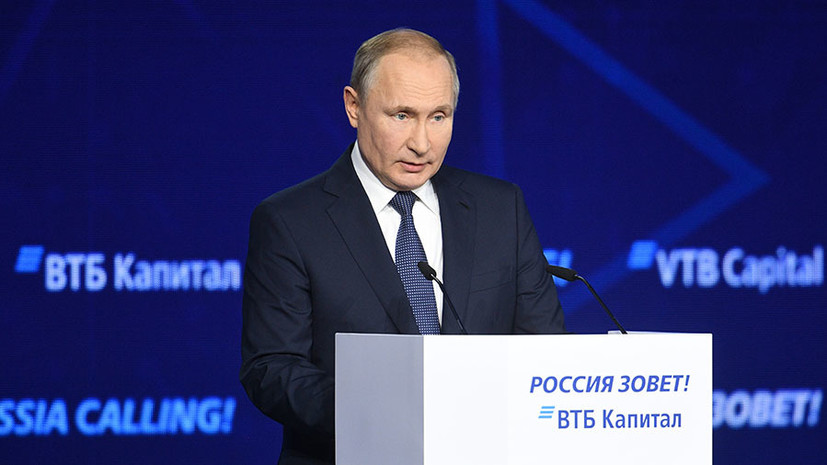Against the background of an increase in real wages, the growth of disposable incomes of the population is practically not observed. On Wednesday, November 20, Vladimir Putin said during a speech at the annual investment forum "VTB Capital" "Russia is calling!"
“Today, wages in Russia are growing both in nominal and in real terms, but at the same time, disposable incomes of citizens practically stand still. Of course, this situation needs to be changed. This is the most important direction of the government’s work, and the results are still very modest, ”the president said.
From January to October 2019, the real disposable income of Russians (income after paying all tax deductions) grew by 0.2%. Such data leads Rosstat. Meanwhile, the overall situation in the Russian economy remains positive, Putin said.
“Despite the slowdown in global growth, positive economic dynamics remain in Russia. Last year, GDP growth was 2.3%. For three quarters of this year, it is more modest - 1.1%. But from the second half of the year there has been a certain acceleration of growth, ”Putin emphasized.
As the First Deputy Prime Minister and Minister of Finance Anton Siluanov stated on the sidelines of the forum, in October the Russian economy grew immediately by 2.2% in annual terms. The head of the Ministry of Finance explained the improvement in the dynamics of GDP growth by the effect of the start of the implementation of national projects.
“We are constantly working on these goals - national projects. This is work with business, and with the regions, and with the federal center. Now we see that there is already a return on these decisions, and the dynamics of economic growth is starting to improve, ”said Siluanov.
In 2019, more than 1.7 trillion rubles should be spent from the federal budget on the implementation of national projects. According to Vladimir Putin, at present, 64% of the total amount of allocated funds has been disbursed.
In 2020–2022, the implementation of national projects will require another 7 trillion rubles from the budget. As the head of state noted earlier, the achievement of the set goals should lead to an acceleration of Russia's GDP growth rates to 3% already in 2021.
One of the main achievements of the Russian economy in recent years, Vladimir called a record reduction in unemployment in the country. According to him, in the first nine months of 2019, the figure averaged 4.6%. As the head of state emphasized, the significance has become the lowest in the modern history of Russia.
At a forum session, the head of the Ministry of Economic Development Maxim Oreshkin noted that in order to improve the dynamics of the Russian economy, it is necessary to increase the share of investments in GDP, increase the efficiency of state financial investments and the economic activity of the population. At the same time, the head of the Accounts Chamber, Alexei Kudrin, considers increasing labor productivity a priority. According to him, the necessary result can be achieved by increasing the share of investment in education above 5% of GDP.
“The volume of government spending on education in Russia is approximately 3.7% of GDP. Innovative countries show from 5 to 8% of GDP. So, if we do not change the share of how much we spend in the competence of a person into new and the most diverse programs, if education does not become more innovative, it is unlikely that we will be able to make turns in labor productivity, ”said Alexei Kudrin.
During the discussion of the prospects for the Russian economy, the forum participants also gave a forecast for the country's GDP growth for 2020. According to Alexei Kudrin, the indicator may increase by 1.3-1.5%. At the same time, Maxim Oreshkin expects growth of 1.7%, and Anton Siluanov admits the achievement of 2%.
Price shift
The forum participants were particularly attracted by the sharp decline in inflation in Russia in recent months. So, after a slight acceleration at the beginning of the year, consumer price growth in Russia began to slow down faster than the authorities expected. According to the Ministry of Economic Development, in October inflation in Russia fell below the target mark of 4% to 3.7%. As expected in the department, in November the figure will be about 3.5-3.6%, and in December it will drop to 3.3-3.3%.
“This year we see that inflation will be closer to 3%. This is much lower than the expectations that the Central Bank had and which we had, ”stated Maxim Oreshkin.
The minister explained the slowdown in inflation by a decrease in aggregate demand in the economy by 1 trillion rubles. As noted by Alexei Kudrin, demand has weakened due to delays in spending budget funds. Against this background, Maxim Oreshkin called on the government and the Central Bank to take measures to maintain demand and bring inflation to the target level.
During his speech, Anton Siluanov also stated the need to accelerate inflation to 4%. Meanwhile, as the Minister noted, a sharp decline in consumer price growth has a positive effect on the income of businesses and citizens.
“A sharp change in inflationary sentiments does not always have a positive effect (on the economy. - RT ), but low inflation is lower than the inflation tax, higher incomes of enterprises and the population,” the Finance Minister emphasized.
Moreover, as the Central Bank noted earlier, the emerging slowdown in inflation has become one of the main reasons for the active reduction in the key rate. In October, the Bank of Russia reduced it for the fourth consecutive time to 6.5%. The value has become the lowest since the spring of 2014.
Recall that reducing the rate is necessary to stimulate business activity in the country and economic growth in general. So, in the long run, the actions of monetary authorities lead to cheaper loans, an increase in domestic demand and investment.

